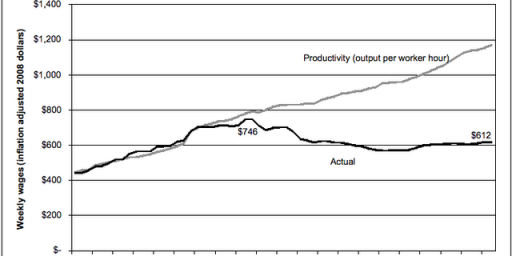Well-Paid Benefit Most As Economy Flourishes
Today’s WaPo fronts a story with the headline “Well-Paid Benefit Most As Economy Flourishes.”
Seems rather axiomatic, no?
The story behind the headline, though, is somewhat more interesting.
Wages are rising more than twice as fast for highly paid workers in the Washington area as they are for low-paid workers, an analysis of federal data by The Washington Post shows. That means the spoils of the region’s economic expansion are going disproportionately to workers who are already well-paid, widening a gap between rich and poor in a place where it is already wider than in most of the country.
Businesspeople cite shifts in the world economy that give educated workers leverage to negotiate for higher wages but make low-paid workers replaceable — a disparity that is especially pronounced in a service economy like Washington’s.
The region’s economy is strong and businesses are expanding, hiring more software engineers, financial analysts, salespeople and other skilled workers, thus bidding up their pay. But companies are simultaneously finding ways to automate clerical tasks, move call centers to cheaper places and handle business online, weakening demand for less-skilled workers.
That’s hardly surprising, of course. This is a trend that’s decades, if not centuries, old.
Still, I always wonder what becomes of the displaced low-skill folks. Sure, being out of work will motivate some of them to go back to school or otherwise acquire more marketable skills. And some chunk of those at the bottom are always there temporarily, either working their way through school or hoping to outwork their competition and get on the management track. But there has to be a sizable percentage that are simply not bright or ambitious enough to move beyond the low-skill sector.
What do the people who used to, say, pump gasoline for a living do in the era of self-service stations? Or the old-time phone operators? I’m willing to wager than precious few of them are now at Microsoft.






Thank god the rethugs managed to raise the costs of going back to school last week…lets keep those wage slaves down!!!!
Or, perhaps some of the ‘jobs that Americans won’t do’ will get filled by Americans, huh?
You might want to check out the prisons and juvenile detentions centers and find out why many of them are there. I’ll bet a lot of them started out with petty theft and moved up to grand larceny.
Then check out the telemarketing centers, Walmart, Sam’s Club, Target, etc… You will find many in those places, trying to earn a living.
The rest are probably living on welfare or off of relatives. It seems there are a lot of letters to Dear Abby from a mother wanting to know how to get her 30 year old son off of her sofa.
These are just a guess, but I bet I am not too far off base.
What happens to the less well off (or even the middle class)? You get a couple of credit cards, pay check loans, department store accounts, and slowly but surely sink into debt. A person could survive several years digging their own grave so long as they make the minimum payments.
I used to pump gas for a living at the Amerada Hess station on Route 1 in Alexandria, Virginia just north of Fort Belvoir.
Now I live in Washington state, where I commute from Auburn to Redmond every morning to work as a software developer at Microsoft.
There may indeed be precious few of us, but we DO exist.
Caliban: But you presumably weren’t pumping gas for a living as a 30-year-old? I’m not talking about summer jobs here.
I have three adopted Korean daughters who came here with nothing, speaking no English, in 1988, aged 12, 9 and 7. My wife and I have worked with the refugee community in Atlanta for the past fifteen years.
We are, therefore, intimately familiar with Atlanta’s large (legal) immigrant community.
Trust me. There are jobs aplenty. Here’s how it works in microcosm:
Phase One – Establishment and Subsistence
Everyone in the family goes to school, studies and graduates or masters enough English to work and conduct business. Children begin willingly working in money earning jobs while they are in school, at leat 20 hours a week after school and on weekends. All of that money goes to the family’s expenses, which are monitored (usually)by mom. Basic transportation is either public or a ten year old Honda, Toyota or Nissan which dad selects and maintains. Shelter is generally in an entry level apartment complex on a main thoroughfare which the sponsoring refugee agency identified. Mom and Dad both work, and dad generally works more than one job. All money over an above basics (and I mean basics) is invested, generally for education, a house, or necessary seed money for a beginning a small service or retail business.
There are other phases, but you get the idea.
These folks think the economy is just great.